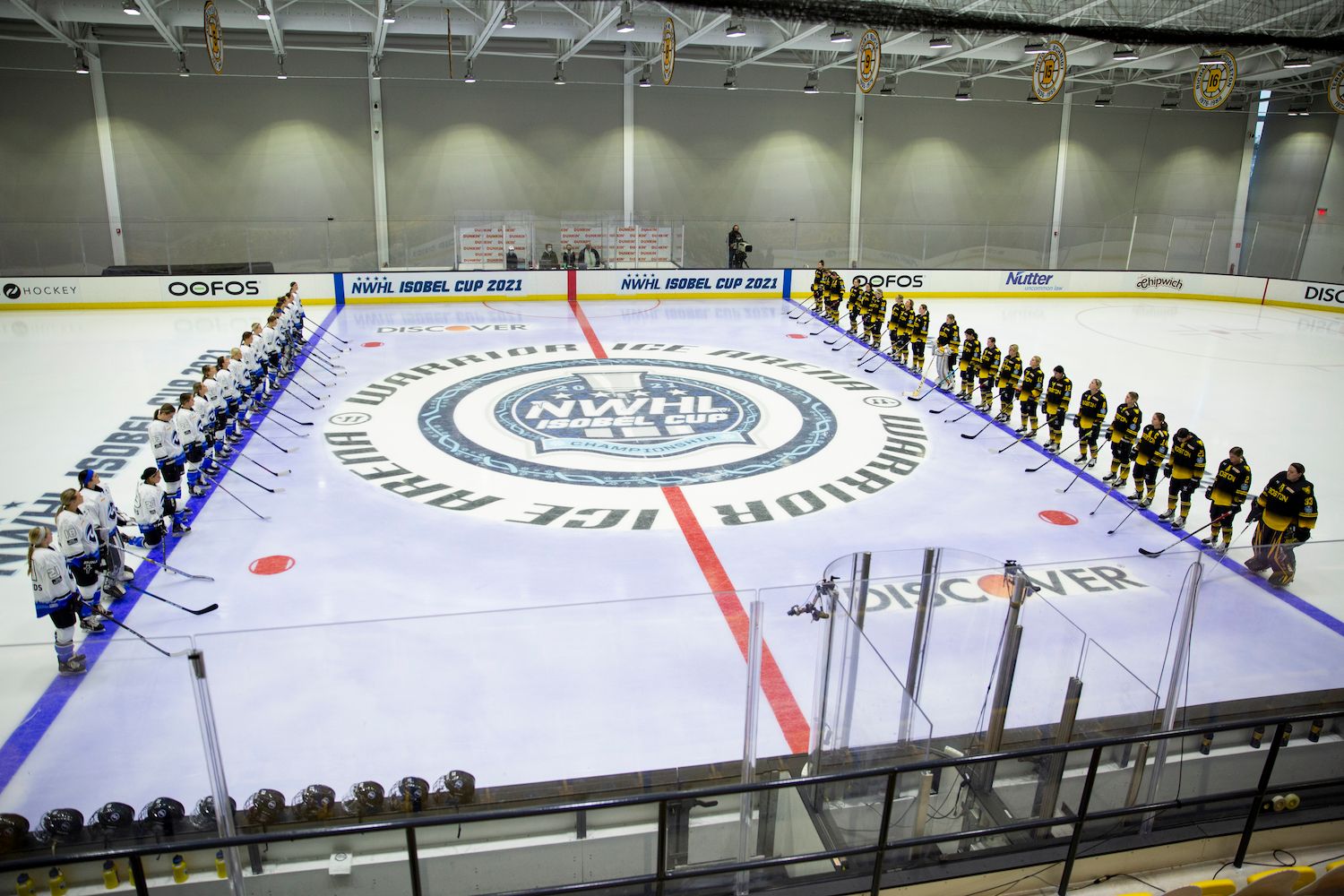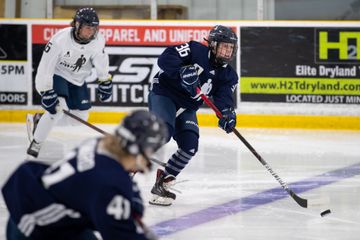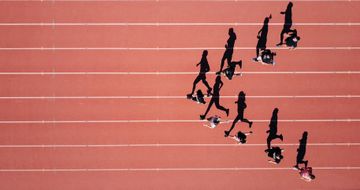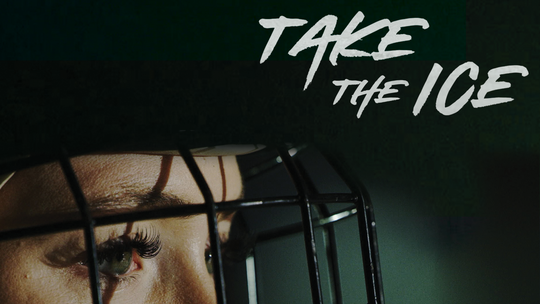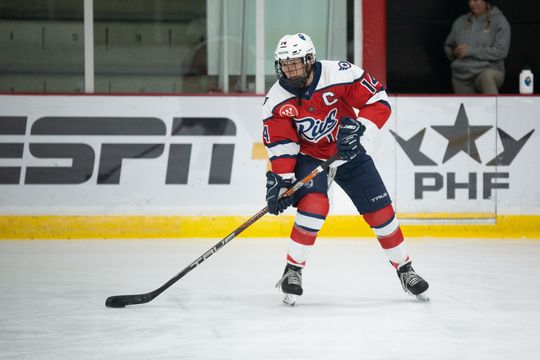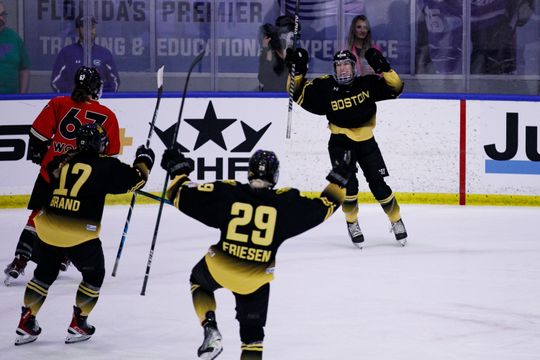The National Women's Hockey League is currently in its offseason following its sixth year of play, but things have been anything but normal over the past few weeks and months. A lot has transpired recently, and it appears as though this could be the tip of the iceberg for what's to come over the approaching summer.
It's been less than a month since the Boston Pride became the first team in NWHL history to win the Isobel Cup twice, but there are still a lot of loose ends regarding this past season that we don't know – and some we may never know – and it's not great for a league that has had problems regarding working conditions and player pay in the past. While the NWHL is under new leadership, these changes don't seem to have had much effect on many of the league's ongoing problems.
The league's choice to not reveal details about player salaries (aside from the existing salary cap of $150,000 for the 2020-2021 season) means we know only that they aren't receiving a living wage. Most players in the league hold jobs in fields such as education, medicine, coaching and the like.
For the past few years, the NWHL has had a revenue sharing program designed to incentivize league-wide sponsorships and engagement in order to add to player base salaries. Initially, the league put forth a 50/50 revenue split, which would see a straight 50% of all league sponsorship monies enter a pool for player distribution. However, prior to the season in Lake Placid (which later finished in Massachusetts), the league quietly issued contract addendums for players to sign, which included COVID-19 safety protocols in addition to an alteration in the revenue sharing model – in the league's favor.
Here's the new language from the contract addendum, which was first presented to players via a slide deck in a Zoom call in early January:
All players who participate in the 2020-2021 Season will be entitled to a pro-rate share of an amount equal to fifty percent (50%) of the revenue generated by the League from the operation of the 2020-2021 Season, net of costs and expenses associated therewith, solely from securing (i) broadcast rights (radio, television, internet streaming or otherwise) for the 2020-2021 Season by the League and (ii) any and all sponsorship transactions entered into by and between the League with any third parties, in connection with the operation of the 2020-2021 Season.
Per this addendum, instead of players being entitled to 50% of league revenue, the addendum made it so that the players' share comes after total 2020-21 league expenses and costs – which has the potential to drastically reduce that benefit or zero it out completely, depending on the league's profits when all is said and done. Previously, the 50/50 revenue split came from sponsorship revenue after "sponsorship activation costs," rather than net profits after total league operation costs.
To clarify... the only potential deduction is production costs... I.e. if a patch is needed on L Shoulder. The breakdown is: (The total contract value - the production of the patch)/2 = Players $$. If there is any agency costs it will come from league half. Regardless of opp cost https://t.co/h13v6nYG2w
— Anya Packer (@battaglinoa) May 31, 2019
The league never publicly announced this change and failed to mention it, including in the late January media release about the league's landmark partnership with Discover Financial Services. They said only that it was "a significant step for the NWHL, which designates 50 percent of league sponsorship revenue to help increase player salaries." The NWHLPA and its former executive director Anya Packer both mentioned the split in a pair of Tweets on March 26th, but neither specified that the split comes after all league expenses have been paid.
NWHLPA representative Shiann Darkangelo spoke to the Victory Press about the change. She said that can only really speak to her own opinion, but stated that the league's changing the structure of the revenue sharing program made sense to her. (Darkangelo has played in the NWHL, the CWHL, and the PWHPA since ending her collegiate career at Quinnipiac in 2015.)
"It's a smart business move. You can't run in a deficit for very long, so from a league standpoint, I think it makes a lot of sense," Darkangelo said. "For us as players, we sign contracts with our teams to play, and then it's just kind of the icing on the cake that we can bring in sponsorships and things like that to continue to support the league and women's hockey as a whole."
"There were a ton of challenges and obstacles from COVID," she added. "Coming in and being able to pull off the bubble in Lake Placid, I think everyone was extremely excited to be in it at a time where other leagues, men's and women's, were folding or getting canceled. I think it was huge to be able to put on that event. Obviously, things changed and it was a constant work in progress each day because you never knew what tomorrow brought."
"Even having to reschedule in Boston, the fact that we got to play, I think everyone was super grateful for that because it's just so unknown with things with COVID," she said. "Being able to even play a handful of games was pretty awesome for us. You sign on for that, especially with this season not knowing, but at the end of the day, everybody wants to get on the ice and play games. That's what we're here for."
Darkangelo said she didn't know exactly how much money ended up in the revenue sharing pot, but emphasized that she looks at any additional income as an added bonus, especially in such an odd year.
"We signed contracts for each team and the revenue split in sponsorships, that's all a bonus," Darkangelo said. "Things happen throughout the season, and obviously with this year being so different, it's unique. There are still expenses I'm sure that are being paid for each event [Lake Placid and Boston]. Things cost a lot of money to put on an event like both of those."
"Stepping back and seeing the perspective of what actually goes into those events, especially being in a bubble, it's much different than just flying in or busing in for game or one weekend," she added. "It was great that we at least had something, that we were able to compete for the Isobel Cup this past year, and we're excited to see where things continue to go and grow this upcoming season."
It's unclear exactly how much the league spent on this past season, but a recent report from Morning Consult said that the league was required to pay $225,000 to the New York State Olympic Regional Development Authority for use of the venue at Lake Placid. Half of that was required as an initial deposit, but neither ORDA nor the NWHL responded to comments on whether the league had paid the fee in full – which means they could still be on the hook for up to $112,500 in that contract alone, not to mention other expenses incurred as a result of Lake Placid and the season resumption in Boston, which presumably came with its own (albeit smaller) price tag. With expenses possibly still waiting to be paid, there's no telling when players will get whatever share of the revenue they're owed, if there's anything left.
(As an aside, NWHL LLC received $226,668 in 2020 and $231,443 in 2021 from the Small Business Administration as part of the Paycheck Protection Program, or PPP. Those funds are a loan designed to cover payroll costs for organizations with 500 or fewer employees.)
CORRECTION: After publication, the NWHL reached out with the following clarifying information regarding the PPP funds:
Prior to October 2020, a single investor group called NWHL, LLC owned the NWHL and four of its six teams (Beauts, Riveters, Whale and Whitecaps). The other two teams (Pride and Six) were owned by a separate investor group called BTM Partners, LLC.
In October 2020, the League was restructured into a form called an "unincorporated association" which shifted "ownership" of the League from NWHL, LLC to the six teams that comprise the League. The League exists for the benefit of its affiliated teams. NWHL, LLC was no longer the owner of the League as of late October 2020.
Since October 2020, NWHL, LLC remains the owner of its four teams but does business as W Hockey Partners. The legal change from NWHL, LLC to W Hockey Partners, LLC has not happened yet.
The entity that applied for, and was awarded, PPP funds is NWHL, LLC and not the League itself.
Meanwhile, the league announced on Wednesday its intention to double the salary cap for the upcoming season, from $150,000 to $300,000. In the media release, commissioner Ty Tumminia called it "increased investment by ownership" while release itself noted a "record-setting campaign for sponsorship activation." Sponsorship figures have never been publicly released, but the increased salary cap attempt would be the highest since the NWHL's second season, when the league significantly slashed salaries just over a month in.
Following the early dismissal in Lake Placid, the league also lost its medical partner, NYU Langone Health. This news was reported by Sports Business Journal; in that article, a spokesperson for NYU Langone said that the center had "created COVID protocols based on our expertise in this area and our commitment to always putting patient safety first. Implementation and enforcement of the protocols was left to the NWHL. We have since terminated our contract with them."
As a league spokesperson said that the NWHL has spent "the past few months" examining options for a new long-term health partnership, this also appears to indicate that the league did not have a medical partner heading into its restart in Boston in late March.
Circling back to Lake Placid, we may never know just how many people involved in the NWHL season ended up contracting COVID-19 as a result of the outbreak, but it's believed to have been about 40 people. Players and staff from at least five of the league's six teams were affected, and as with the conditions of the pandemic and the virus, we can't know what the long-term effects could be, weeks or months down the line.
The league has also faced rightful backlash after it was revealed that Toronto Six head coach Digit Murphy was listed as a supporter of the transphobic Women's Sports Policy Working Group. (Shoutout to D.F. Pendrys for initially unearthing this connection.)
The league, and the Six, continued to post like normal on their social media accounts for a while after the revelation, but were finally forced to make statements. Even then, it didn't get much better, as the Six's initial statement used the incorrect term "transgendered," and another coach defended Murphy on social media. The NWHL did say that they will review their policies in their statement, but it remains to be seen if that review will lead to changes in the league's trans inclusion policy, which focuses on hormone levels rather than the well-being of trans athletes.
The league's other teams eventually released a very bland, basic statement that spoke about "changing systems that exclude our non-binary fans" but that failed to mention players, coaches, and league staff as part of the equation.
Former NWHLPA Executive Director and current Riveters GM, Anya Packer, provided this statement to the Victory Press regarding the statement the teams made:
"I approached the idea of putting out a statement today on our WHP [Women's Hockey Partners] Leadership call, which was met with full approval from our president and the other GMs agreed with my points and also wanted to support. I then drafted the statement and shared with my fellow GMs from WHP the sentiments for them to rewrite, all decided to use the same statement as the Riveters. And then we saw Boston follow suit as well," Packer said.
The Six ownership eventually released their own statement, standing by Murphy and committing to "a third-party facilitated training session."
There has been no apology or response from Murphy, who has since been removed from the transphobic group's list of supporters on their website. She hasn't been with the league that long, but it appears that several people within the league are overall not pleased with her involvement and influence, as well as her treatment of others, which stretches further than just the issue of her being involved with the transphobic group.
Neither the team, nor the league, has commented on Jessica Platt's Twitter thread about how she expressed interest to the Six's GM in playing for their team. Platt, who is a transgender athlete, was told her contact info would be passed along to the coach, and then never heard anything else, despite the fact that the team certainly had open roster spots and she would have been a strong option to consider due to her CWHL experience.
Oh, and the league has yet to really address the Barstool problem.
In defense of trans rights, Lindsey Migliore ("GamerDoc"), who has previously hosted the NWHL's "Open Ice" show on Twitch, spoke up and stepped down from her role. The league recently announced a trio of offseason shows to be hosted by Katie Gaus, leaving many to wonder what had happened to GamerDoc, who also serves as executive director of Queer Esports. Migliore released the following statement:
An update on my involvement in the hockey community. pic.twitter.com/8piDKVZOW0
— GamerDoc (@GamerDoc_) April 14, 2021
It's important to hold pro sports leagues accountable on subjects such as labor and working conditions, salaries, LGBTQ+ policies, inclusivity, racism, and diversity. Women's sports don't get a free pass on these things, and they aren't necessarily more inclusive or more welcoming simply because they're women's sports. I could write an entire article about just this topic alone, but honestly, I suggest you read some of Andrew's work here.
Additionally, Kate Whitman Annis was recently named Director of Operations for W Hockey Partners, the group which operates the four teams without independent ownership. This comes in spite of the fact that, per Marisa Ingemi, a group of Metropolitan Riveters players asked the league to remove her as GM during Lake Placid due to communication issues and disagreements about how decisions were handled. Now, Whitman Annis has essentially been promoted, while Anya Packer is replacing Whitman Annis as Riveters GM.
If I can take a step back from reporting for a minute here, I want to say this: it's a lot. I would have liked nothing more than to sit down and write a regular end-of-season recap like I normally do, to highlight the top players and big moments on the ice. The league recently unveiled its annual award winners, announced plans to double the salary cap, and revealed plans for its upcoming free agency and draft. But there's a lot more at stake here than hockey and sports; these are issues of labor and fair treatment of employees, of a sports business model that appears to be hanging in the balance, and of transphobia that has serious impacts on people's lives and well-being. It's crucial that in times like this, we don't turn away or just let positive PR distract us from other issues; we must continue to think critically and look deeper.
When asked for comment on a number of the aforementioned topics, including whether the NWHLPA was consulted before the revenue sharing was altered, how much money is left in the pool for players, and about any plans to revisit the league's trans inclusion policy, an NWHL representative said: "It would be premature to comment ahead of upcoming meetings of the league's Board of Governors." Player bonuses from season six are due tomorrow, Friday April 30.
(Photo: Michelle Jay/NWHL)
